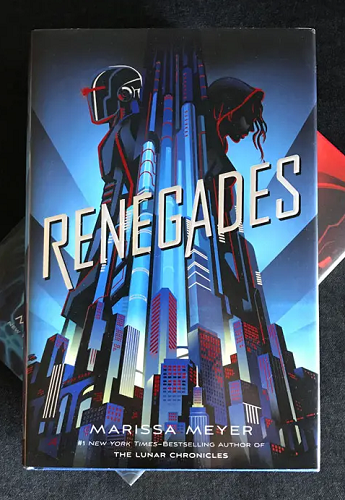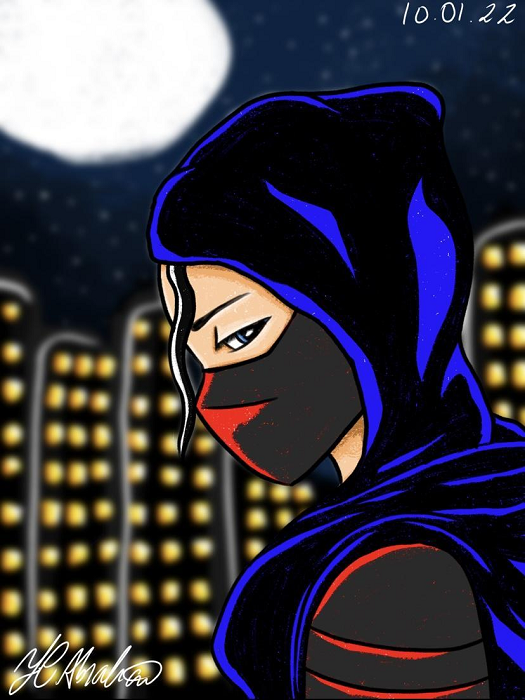Por Júlia Abrahão
.
The Philosophy Behind Heroes and Villains.
.
“One cannot be brave who has no fear”
Renegades, Marissa Meyer
Renegades is the first book of the science fiction trilogy written by Marissa Meyer, published in 2017 by Feiwel & Friends. Meyer makes her own take on the classic, but still relevant, heroes and villains. Nova Artino, the main female character of the books, is an orphan, born in the villains side, The Anarchists, who had been previously defeated a decade ago and now lived in the shadows of the world. Adrian Everhart, Nova’s male counterpart, is the son of the heroes who now are in charge of everyone else. Both are “prodigies”, meaning they possess some form of superhuman ability. The main plot of the book follows Nova as she infiltrates the heroes teenage combat training facility, the Renegades, undercover to take the heroes down from the inside.
Now, ever since the interest in superheroes went sky high due to Marvel studios growing popularity, we see more and more discussions taking place between the youth about right and wrong, heroes or villains. With time, it has been noticed that everything is not so black and white, slowly humanizing the villains and holding the heroes accountable for their mistakes. Heroes are no longer good people with unwavering morals and selfless personality, but also narcissists and control freaks, who don’t always know the correct thing to do. Villains aren’t always crazy power hungry unpredictable monsters with no ounce of compassion, but sad traumatized people that sometimes are scarily rational.
“Maybe Ace really was a villain. Or maybe he was a visionary. Maybe there’s not much of a difference.”
Renegades, Marissa Meyer
The thing that makes Renegades such an interesting read is its capacity to make the reader doubt its own conviction. Take a step back and avalia-te your thoughts before opening the book. Nova is a villain, Adrian is a hero. Nova is wrong, Adrian is right. Nova is gonna meet Adrian, realize she’s wrong and switch sides. That’s what comes to mind in the beginning, the black and white vision we as humans are far too advanced to keep constricting ourselves to. The complex dynamic between Nova and Adrian is what births the philosophical dilemmas within the book. As Nova starts to question the strategies used by the Anarchists to make the world better and independent , Adrian starts understanding that the label hero doesn’t make you inherently good and that the tight leash the heroes hold on the civilization can be as dangerous as unrestricted freedom.
“Everyone wants to be a hero. When you think about it, it’s a little sad that so few actually get to be one.” Nova couldn’t contain a derisive sniff. “It would be sad, except they don’t actually mean it.” Adrian cocked his head at her. “What do you mean?” “There’s no rule that says you have to be a prodigy to be a hero,” she insisted. “If people wanted to stand up for themselves or protect their loved ones or do what they believe in their hearts is the right thing to do, then they would do it. If they wanted to be heroic, they would find ways to be heroic, even without supernatural powers.” She wiggled her fingers in mockery of said powers. “It’s easy to say you want to be a hero, but the truth is most people are lazy and complacent. They have the Renegades to do all the rescuing and saving, so why should they bother? It’s easier to just call the hotline, then turn the other way and pretend it’s not your problem to solve.”
Renegades, Marissa Meyer
The whiplash between both sides of the coin fabricates a sense of frustration in the reader, as their minds are constantly swayed. You sympathize with the villains because, as unsustainable as their tactics are, they are reasonable in their beliefs. You’re untrustworthy of the heroes because, as ethic they seem to be, they control a bit too intensely for it to feel as democratic as they claim. Meyer just further reinstates the knowledge that everything in the world is about balance, reminding the reader constantly that if compromises were made and strategies were combined, perhaps a better outcome would arise.
For all its moralistic nature, Renegades by Marissa Meyer is a very light, fun and entertaining read. Meyer’s writing is soft and easy to follow, making the trilogy perfect for a younger audience to understand and still absorb an important lesson. It is also a must for every adult fan of superheroes. In the end, Renegades isn’t a dystopian novel about heroes and villains, but a tale about society complexity. As always, I finish it off with my favorite quote and my fanart.
“You mean people don’t like to see hypocrisy in their leadership? Shocking.”
Renegades, Marissa Meyer

